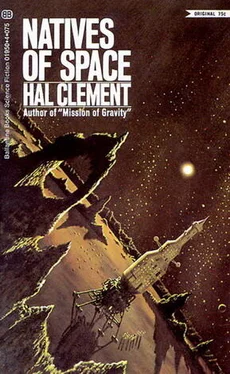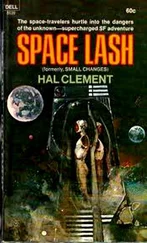Well, let that go for a minute. Kirk had arrived at his camp, and prepared a light meal. He ate slowly, still thinking, and washed the few utensils in the same fashion. The Sun had long been gone, and he sought his blankets with the intention of sleeping on the problem.
Sleep refused to come. He would absolutely refuse to consider one angle, and another promptly rose to torment him. What was the gas the aliens used? Kirk was not sure whether or not he regretted his ignorance of chemistry. The train of thought led by imperceptible, but perfectly natural, steps to the idea of insect poisons, his own original job in the territory, and the stock of copper sulphate and arsenate of lead which was stored at the river mouth port, for use the following spring. The idea left his mind as quickly as it had entered; for such materials did not, so far as Kirk knew, form any kind of gas. The job recalled his other occupation, which was still that of acquiring an education. The imminent opening of college presented itself as an additional reason for immediate departure; it was doubtful even now whether he could return to the States in time for registration — unless, he thought with a flicker of amusement, the aliens performed the necessary transportation. And so the trail of thought led itself in a circle, and he was once again considering the matter of the requirements of those on the spaceship.
And then another thought struck him. Let it be granted that the herald had adhered strictly to the truth at all times. He might, then, be a likable individual; he might be a shepherd trying to save the lives of his flock; he might be an officer worthy of respect for his ability and devotion to duty — no matter what he might be in his character, the simple and undeniable fact remained that, by his own admission of past activities and by his declaration of the uses to which he intended to put the weapons he hoped to acquire, he was neither more nor less than a pirate. He had stated plainly that Boss had revolted against the authority of his original ruler; he had tacitly admitted that he himself had concurred in the expression of independence; and he had used the term “outlaw” in describing the ship and its crew.
If Earth were to have any dealings with the herald’s people, they would normally be with the law-abiding section of society. Kirk had no moral right to give assistance to that crew, no matter what his personal feelings might be. For a while, the Earthman pondered the matter, seeking flaws in the argument — seeking them solely because of the friendship he had commenced to feel for Talker, for any sort of decision would be a boon to his tortured mind.
But the fact stood; and eventually Kirk ceased attempting to argue it away, and accepted the simple idea that aiding the strangers would be, legally and morally, an offense against justice.
Owing to the natural contrariness of human nature, he now found himself wishing he could help the alien with whom he had conversed so long; but the attainment of a decision had eased the tension in his mind, and at long last the man succeeded in falling asleep. He might have slept even more peacefully had he known a single fact — one of which not even Talker and Boss had dreamed.
Their interstellar voyage had consumed, not four hundred days, but more nearly forty years. The greater part of the flight had been made at a speed near that of light; hours of ship’s time had been days outside. A similar period was certain to elapse on the return; and the ruler who had been defied would certainly have been succeeded by another. Talker and Boss could easily have passed themselves off as returning members of a legitimate interstellar expedition; even had they failed to do so, it is unlikely that they would have been punished for defying a ruler whose place their judge, as likely as not, would have inherited either by private assassination or conquest in war.
Unfortunately, Talker’s race had no inkling of relativity, as their science was of the type which develops better guns and faster ships, without bothering too much with theory; and Kirk’s only acquaintance with the concept had been made through the pages of a classic novel on time travel — the only such work he had ever read, and one which had emphasized the fourth dimension rather than velocity-mass ratios.
When Kirk awoke, therefore, it was with a distinctly uncomfortable feeling connected with the day’s probable events. He rose, shivering in the biting cold of early morning, washed and ate, and broke camp. Whatever happened, he intended to head south that day, and he carefully made tent, blankets, and the other gear into a single large pack. This he cached near the camp site; then he picked up his rifle and took the trail over the hill into the next valley. He was fairly sure that the aliens could not harm him, except by landing their vessel on top of him, since they were without weapons and far inferior to him in physical strength.
But why, he suddenly thought, should there be any trouble? He need not refuse to help; it was simple truth that he had not been able to solve the problem — he still had no idea of the identity of the substance they desired. He could keep to himself his opinion of their occupation. Kirk was sure that the words describing that opinion had not been used in any of his conversation with Talker, and the herald must by this time be accustomed to receiving untranslatable waves from the Earthman’s mind.
Thus determined, Kirk now emerged from the forest to the bank of the arroyo where the interstellar flier lay. As usual at this time of day, none of the crew was visible; also as usual, Kirk attracted attention to the fact of his presence by sending a stone clattering against the outer hull.
Talker, in spite of the evermounting fatigue that was threatening the lives of his party as much as any other single trouble, had also spent a portion of the night in thought. He had seen more and more clearly in the last few days that the chances of Kirk’s learning the name of the poison were microscopic. A practical chemist, given a sample of the substance, could have identified it without difficulty; but without even a milligram sample on board, it seemed doubtful whether anyone could tell what was needed. The natives of this planet had, and used, poison gases; Kirk had told him that much. In their case, however, it was necessary in general to use them outdoors, and special characteristics of density and effectiveness were thus required. Talker knew that his gas was about twice as dense as the air of this world, under the same conditions of temperature and pressure; but he had no idea of the extent of its toxic qualities on terrestrial life.
The only chance, it seemed, if Kirk failed in his task, was to have him direct the voyagers to a place where someone skilled in chemistry, or warfare, or both, might be found. The herald had learned to communicate; the rest should not be difficult.
So it came about that Talker answered the bell-like clang on the hull with his mind set to expect the worst, and prepared to do something about it. He noticed at once that the human being was carrying his rifle, which he had not done since the first day, and the alien partially interpreted the reason for the act. He flew to the bank and squatted in front of Kirk, antennae alertly spread. The Earthling, his mind made up, wasted no time.
“I have not solved the problem,” he stated flatly.
“I am not surprised,” wrote Talker, “nor am I angered. There was no need to bring the weapon —
you cannot be blamed for failure at a task where one better trained than you could probably have done no more. It would be childishly stupid to hold animosity against you, in spite of our disappointment.
“But you can still help us, There must be, somewhere on this planet, individuals who are trained in such matters. You have mentioned your own need of getting out of this region before the onset of winter. We could easily transport you to your own place, and you in return can direct us to such a person as I have described. Are you willing?”
Читать дальше












